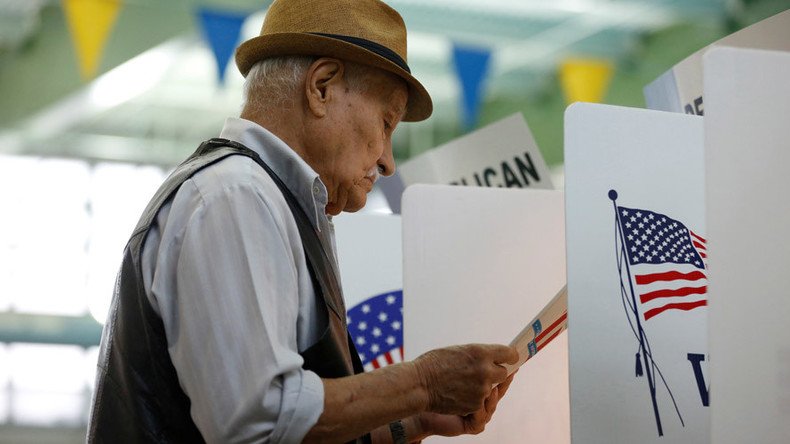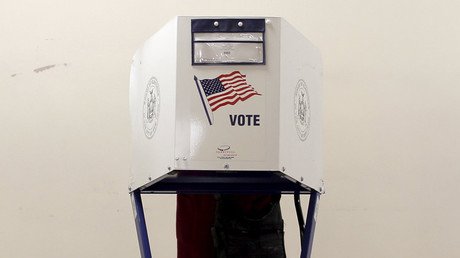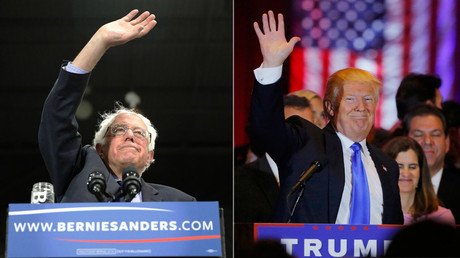Votes that don't count: More than 200k provisional primary ballots discarded in 2016

Over 220,000 provisional ballots for presidential primaries in at least 18 states have been discarded, according to a new report. Provisional ballots are backup versions used when a voter's eligibility cannot be immediately verified at the polls.
Data gathered on provisional ballots cast in 2016 presidential primary elections in 23 states, as well as New York City, Arizona's Maricopa County, and the Kansas Republican caucus, indicate that many states are discounting votes at a high rate, according to an analysis by the Huffington Post.
Eighteen states, plus Maricopa County and New York City, tossed a total of more than 220,000 provisional ballots, the analysis found. Five additional states that held early primaries said they require counties to keep data on provisional ballot actions, thus there is no statewide collection of information. On top of that, another five states — California, Montana, New Jersey, New Mexico, and South Dakota — and the District of Columbia held primaries in recent weeks, therefore data was unavailable.
In the 18 states and two localities that did offer data on provisional ballots, the Huffington Post found that a dozen of them fully counted less than 50 percent of their backup ballots. Louisiana was the lowest, at only 5 percent. Only three — Mississippi, Kansas, and Ohio — counted more than 74 percent of provisional ballots.
In 2002, following widespread voting inefficiencies and mishaps in the 2000 presidential election, the Help America Vote Act was passed in order to offer provisional ballots to voters whose eligibility was indeterminable at a polling place for a variety of potential reasons, often as the result of human error. Provisional or affidavit ballots act as a backup ballot in such a case, yet the 2002 law established scant guidance on how the ballots should be counted, resulting in patchwork rules across the US.
While provisionals were designed to serve as a backup ballot until a voting precinct or board of elections could verify a voter's eligibility, experts have warned that the recent flood of Voter ID laws passed by state legislatures around the country have triggered an increased distribution of provisional ballots.
Studies cited by the Huffington Post have found that use of provisional ballots tracks closely with large populations of racial minorities or non-English speakers in an area.
In May, New York City's election board said that it discounted around 90,000 of 121,000 provisional ballots. Shortly before the New York state presidential primary, it was revealed that a bureaucratic error resulted in the loss of more than 100,000 voter names on New York City's voting rolls.
In California, which held its primary on June 7, state election officials are still in the process of counting ballots. As of June 16, the state secretary of state's office reported that there are about 1.4 million ballots left to be counted. Even so, the state's Democratic primary contest was called for presidential candidate Hillary Clinton.
(2) @AlexPadilla4CA@latimes you can see in the corner that this list of registered voters was printed 5/3/16.... pic.twitter.com/DlRxA7f06Y
— Charlie Carver (@Charlie_Carver) June 8, 2016
(3) @AlexPadilla4CA@latimes it forced anyone registered after 5/3 to vote with a provisional ballot. pic.twitter.com/szOD79eQCw
— Charlie Carver (@Charlie_Carver) June 8, 2016
California's voting rules, however, have received criticism for requiring independent or No Party Preference voters seeking a Republican or Democratic Party ballot to request a "crossover ballot." Poll workers in the state were reportedly instructed to hand out provisional ballots to independent voters unless they specifically asked for a "crossover ballot," essentially asking voters to recite the proper code words to access a major party ballot, according to independent journalist Greg Palast.
Guidance from the state's Election Officer Training Manual says, "A No Party Preference voter will need to request a crossover ballot from the Roster Index Officer. (Do not offer them a crossover ballot if they do not ask)," Palast reported.
He pointed out that Democratic-leaning independents in California overwhelming supported Clinton's rival, Bernie Sanders, while registered Democrats preferred Clinton.
Just a reminder that if you cast a provisional ballot in California, you can track your vote to make sure it counts: https://t.co/TSnCz85Hze
— Matt Pearce (@mattdpearce) June 11, 2016














